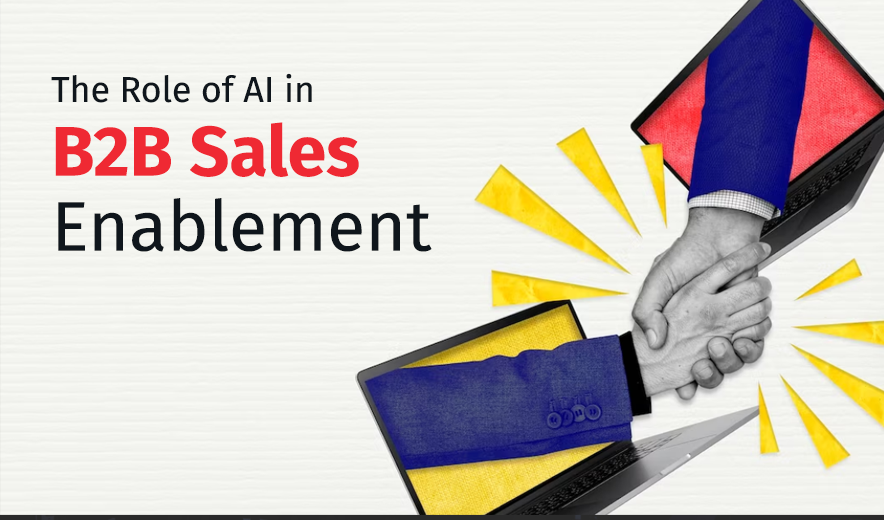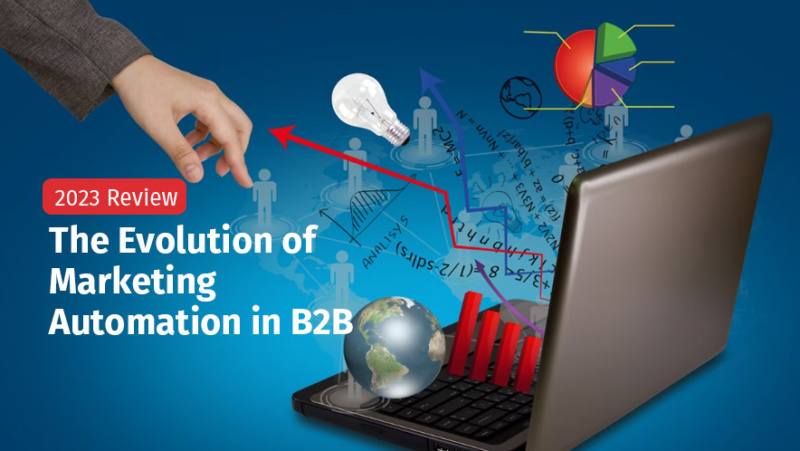In the dynamic landscape of B2B sales, the integration of Artificial Intelligence (AI) has emerged as a transformative force, empowering sales teams in unprecedented ways. With its advanced data analytics capabilities, AI enables sales professionals to glean invaluable insights from vast datasets in real time. These insights illuminate customer behavior patterns, preferences, and market trends, empowering sales teams to make strategic, data-driven decisions.
One of the most significant advantages AI offers is in lead management. Through sophisticated algorithms, AI systems can autonomously score and qualify leads based on diverse parameters, such as past interactions and purchase history. This automation not only saves time but also ensures that sales efforts are concentrated on leads with higher conversion potential, maximizing the team’s efficiency.
AI facilitates accurate sales forecasting by analyzing historical data and identifying patterns that human analysis might overlook. This foresight equips businesses with the ability to predict market trends, enabling proactive strategies and resource allocation.
Personalization lies at the heart of successful sales endeavors, and AI plays a pivotal role. By analyzing customer data, AI algorithms empower sales teams to craft personalized engagement strategies. These strategies resonate with individual customers, addressing their specific needs and pain points. Consequently, this tailored approach enhances customer satisfaction and significantly boosts conversion rates.
In the realm of customer interaction, AI-driven chatbots and virtual assistants have become invaluable assets. These intelligent systems handle routine inquiries, offer product information, and even assist in the sales process. By automating mundane tasks, sales representatives can focus on building meaningful relationships and closing deals, thereby enhancing overall productivity.
It excels in automating repetitive tasks integral to the sales process, such as data entry and appointment scheduling. By automating these tasks, AI allows sales professionals to channel their energies into strategic activities, augmenting their effectiveness.
Dynamic pricing optimization, another facet of AI, ensures that pricing strategies remain competitive and profitable. AI algorithms analyze market demands, competitor pricing, and customer behavior to dynamically adjust prices. This not only maximizes profits but also ensures that the business maintains its competitive edge.
AI’s impact on customer relationship management (CRM) is also noteworthy. By analyzing customer interactions, AI enhances CRM systems, offering actionable insights. Sales teams benefit from suggestions on optimal communication timings, relevant talking points, and effective follow-up strategies. This level of informed engagement strengthens customer relationships and fosters loyalty.
AI facilitates continuous learning within sales teams. Through AI-driven platforms, sales calls can be analyzed, providing valuable feedback to representatives. This feedback loop aids in refining communication and negotiation skills, elevating the proficiency of the entire sales team.
Its prowess extends to market analysis and competitor monitoring. Real-time analysis of market trends, competitor activities, and customer sentiments equips sales teams with timely, actionable intelligence. Armed with this knowledge, sales strategies can be adapted promptly, ensuring businesses stay ahead of the curve and capitalize on emerging opportunities.
In essence, the infusion of AI into B2B sales processes is more than a technological advancement; it represents a paradigm shift. By harnessing the power of AI, sales teams not only enhance their efficiency and effectiveness but also cultivate deeper, more meaningful relationships with customers, thereby driving sustained business growth and profitability.
AI-Powered Sales Predictions
AI-powered sales predictions have revolutionized the way businesses anticipate customer behavior, enabling them to make strategic decisions and optimize their sales strategies effectively. By leveraging advanced algorithms and data analytics, AI offers invaluable insights into customer behavior, preferences, and buying patterns.
Role of AI in Predicting Customer Behavior
Data Analysis: AI processes vast amounts of historical customer data, including purchase history, interactions, and demographics. By analyzing this data, AI identifies patterns and trends that are beyond the scope of traditional analysis. It can recognize subtle correlations, leading to a deeper understanding of customer behavior.
Predictive Analytics: AI employs predictive analytics to forecast future customer actions. Through machine learning algorithms, AI models can predict which products a customer is likely to purchase when they are likely to buy, and at what price point. These predictions are based on a multitude of factors, including past behavior, online interactions, and external influences.
Behavioral Analysis: AI systems can conduct behavioral analysis by tracking customer interactions across various touchpoints, such as websites, social media, and mobile apps. By understanding how customers navigate these platforms and engage with content, businesses can tailor their marketing and sales efforts to align with customer preferences.
Sentiment Analysis: AI-driven sentiment analysis tools scan social media posts, customer reviews, and other textual data to gauge customer sentiment. By understanding customer emotions and opinions, businesses can adjust their strategies to address concerns and capitalize on positive feedback.
Improving Sales Strategies with Accurate Predictions
Targeted Marketing Campaigns: Accurate predictions enable businesses to segment their customer base effectively. By identifying specific customer groups with similar buying behaviors, businesses can create targeted marketing campaigns. These campaigns resonate with customers, leading to higher engagement and increased sales.
Personalized Customer Experiences: AI predictions facilitate personalized customer experiences. Businesses can customize product recommendations, marketing messages, and promotional offers based on individual customer preferences. Personalization enhances customer satisfaction, leading to repeat purchases and brand loyalty.
Inventory Management: Accurate sales predictions are invaluable for inventory management. By accurately forecasting demand, businesses can optimize their inventory levels. This prevents overstocking or understocking, ensuring products are available when customers want to make a purchase.
Dynamic Pricing Strategies: AI-powered predictions enable businesses to implement dynamic pricing strategies. By analyzing market demand and competitor pricing, businesses can adjust prices in real time. This flexibility ensures that prices remain competitive, maximizing revenue and profit margins.
Improved Customer Service: Predictive analytics also enhance customer service. By anticipating customer needs and issues, businesses can proactively address concerns, provide timely support, and enhance overall customer satisfaction. Content customers are more likely to make repeat purchases and recommend the business to others.
.
AI-powered sales predictions play a pivotal role in shaping modern sales strategies. By accurately anticipating customer behavior, businesses can optimize their marketing efforts, personalize customer experiences, manage inventory efficiently, implement dynamic pricing, and enhance customer service. These improvements not only drive sales but also foster long-term customer relationships, positioning businesses for sustainable growth and success.
Automating Routine Sales Tasks
AI technology has transformed the way sales teams operate by automating routine tasks, allowing sales professionals to focus on more strategic activities. Here’s how AI handles repetitive sales tasks and the impact it has on time savings and efficiency:
1. Data Entry and Management:
AI-powered tools can automatically capture and enter data from various sources such as emails, CRM systems, and social media platforms. These tools eliminate the need for manual data entry, reducing the chance of errors and saving significant time for sales representatives.
2. Lead Qualification and Scoring:
AI algorithms analyze leads based on predefined criteria, ensuring that sales teams prioritize high-value prospects. By automating this process, sales representatives can concentrate their efforts on leads with a higher likelihood of conversion, thereby increasing efficiency and sales productivity.
3. Email Campaigns and Follow-ups:
AI-driven email marketing tools can analyze recipient behavior, such as open rates and click-through rates, to personalize follow-up emails. These tools can also schedule and send emails at optimal times, increasing the chances of engagement. Automation in email campaigns not only saves time but also improves response rates.
4. Appointment Scheduling:
AI-powered chatbots and scheduling assistants can handle appointment bookings. By analyzing calendars and suggesting suitable time slots, these tools eliminate the back-and-forth communication typically involved in scheduling meetings. This streamlined process saves time for both sales representatives and prospects.
5. Customer Support and FAQs:
AI-driven chatbots can handle customer inquiries and frequently asked questions. These bots provide instant responses to common queries, freeing up sales teams from repetitive support tasks. This instant support enhances customer satisfaction and allows sales representatives to focus on complex customer interactions.
Statistics on Time Savings and Increased Efficiency:
- According to a study by McKinsey, businesses can automate approximately 45% of the activities people are paid to perform, including sales tasks. This automation leads to significant time savings across various functions, including sales.
- Salesforce, a leading CRM provider, reported that sales representatives can save up to 23% of their time by automating administrative tasks using AI-powered tools.
- According to a report by InsideSales.com, sales teams using AI-powered lead prioritization and predictive analytics experienced a 50% increase in leads and a 46% increase in appointment rates.
These statistics underscore the substantial impact of AI automation on sales efficiency. By automating routine tasks, sales teams can reallocate their time and energy toward building customer relationships, closing deals, and focusing on strategic initiatives, ultimately driving business growth and revenue.
Personalization and Customer Engagement
AI-driven personalization in B2B sales has proven to be a game-changer, significantly enhancing customer engagement and driving business success. Here’s a look at the impact of AI-driven personalization, along with examples of businesses that have excelled in customer engagement through AI technologies
Impact of AI-Driven Personalization in B2B Sales
Improved Customer Satisfaction: Personalization based on AI analysis of customer data leads to tailored product recommendations and customized marketing messages. According to a study by Accenture, 91% of consumers are more likely to shop with brands that provide relevant offers and recommendations. This level of personalization improves customer satisfaction and loyalty..
Higher Conversion Rates: AI-driven personalization optimizes the sales journey by delivering the right content and offers to the right audience at the right time. According to a report by Evergage, 88% of marketers have reported a measurable lift in business results due to personalization, including increased conversion rates.
Increased Cross-Selling and Upselling Opportunities: AI algorithms can identify cross-selling and upselling opportunities based on customer behavior and preferences. According to Salesforce, businesses using AI-driven recommendations experienced a 70% increase in cross-selling and upselling revenue.
Enhanced Customer Retention: By understanding individual customer needs and preferences, AI-powered personalization helps businesses create long-lasting relationships. According to Gartner, organizations that successfully implement personalization could see a 15% profit boost by 2020.
Examples of Businesses Excelling in Customer Engagement Through AI
Amazon Business: Amazon Business, the B2B arm of Amazon, uses AI algorithms to analyze purchasing patterns and provide personalized product recommendations to businesses. This approach has significantly increased customer engagement, leading to higher sales and customer satisfaction.
Adobe: Adobe’s AI-powered platform, Adobe Target, enables businesses to deliver personalized content and experiences to their customers. By tailoring content based on user behavior, Adobe helps businesses enhance customer engagement. One of their clients, T-Mobile, reported a 50% increase in customer engagement after implementing Adobe Target.
IBM Watson: IBM Watson, an AI-powered system, assists businesses in understanding customer behavior and preferences. Watson analyzes vast amounts of data to provide actionable insights, enabling businesses to personalize their communication and engagement strategies effectively.
SAP Hybris: SAP Hybris, an AI-driven customer engagement platform, helps businesses deliver personalized experiences across various channels. By leveraging AI, SAP Hybris enables businesses to understand customer intent and deliver relevant content and offers. This personalization has resulted in increased customer engagement and higher conversion rates for businesses using the platform.
In summary, AI-driven personalization in B2B sales improves customer engagement and contributes significantly to revenue growth and customer loyalty. Businesses that embrace AI technologies to understand and cater to their customer’s unique needs are poised to thrive in the competitive landscape of B2B sales.
Measuring AI’s Impact on Sales
When measuring the impact of AI on sales enablement, several key performance indicators (KPIs) and metrics can provide valuable insights into its effectiveness. Here are some KPIs and industry benchmarks commonly used to evaluate the impact of AI on sales
1. Conversion Rates
KPI: Measure the percentage of leads that convert into customers after AI implementation.
Benchmark: The average conversion rate varies by industry, but according to HubSpot, the average conversion rate for B2B companies is around 1.5%.
2. Lead Response Time
KPI: Measure the time taken by the sales team to respond to leads generated by AI tools.
Benchmark: According to InsideSales.com, the odds of qualifying a lead decrease by 6 times if a response is delayed by just 5 minutes.
3. Lead Qualification Accuracy
KPI: Measure the accuracy of AI algorithms in qualifying leads that result in successful conversions.
Benchmark: Aim for a high accuracy rate; however, benchmarks may vary based on the complexity of the sales process.
4. Customer Engagement Rates
KPI: Measure the level of customer engagement, such as click-through rates, email open rates, and social media interactions, resulting from AI-driven personalized content and recommendations.
Benchmark: Benchmark engagement rates against industry averages and aim for continuous improvement. Industry benchmarks for specific engagement metrics can often be found through marketing research organizations.
5. Sales Cycle Length
KPI: Measure the average time it takes from the initial contact with a lead to closing the deal with the help of AI-driven insights and automation.
Benchmark: The ideal sales cycle length varies by industry, but AI-powered sales processes often reduce the sales cycle significantly. Compare your sales cycle length before and after AI implementation to evaluate the impact.
6. Customer Retention and Upselling
KPI: Measure the rate at which existing customers are retained and upsold additional products or services due to AI-driven personalized recommendations.
Benchmark: Compare customer retention rates and upselling success against industry averages. Aim to exceed these benchmarks to demonstrate the effectiveness of AI in customer relationship management.
7. Return on Investment (ROI)
KPI: Calculate the ROI by comparing the cost of implementing AI tools with the additional revenue generated and cost savings achieved.
Benchmark: Industry benchmarks for ROI in AI-driven sales initiatives may vary, but a positive ROI is essential for any successful implementation.
It’s important to note that benchmarks can vary widely across industries and company sizes. Therefore, it’s crucial for businesses to establish baseline metrics before implementing AI in sales and continually track these metrics to measure the impact accurately. Regularly analyzing these KPIs will provide valuable insights into the effectiveness of AI in sales enablement and help businesses make data-driven decisions to optimize their sales strategies.
Be a part of our community for free and access the best resources, trends, and new technologies from peers and industry experts. You can also check out our other awesome blogs over here.





